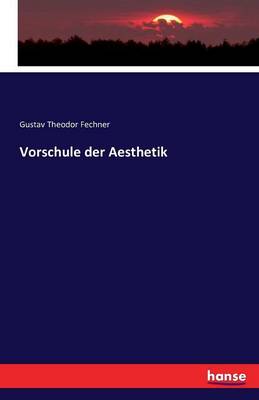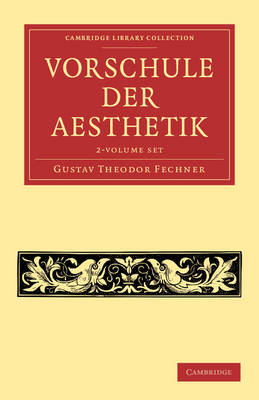Cambridge Library Collection - Art and Architecture
2 primary works • 4 total works
Volume 1
Although Gustav Theodor Fechner (1801-87) had studied medicine at the University of Leipzig, he never practised as a doctor. In the 1820s he published satirical evaluations of the medical science of the day under the pseudonym 'Dr Mises' and supplemented his income by translating chemistry and physics texts. Increasingly he focused his studies on mathematics and physics, and the physical and physiological became recurrent themes in his work. With the publication of his Elemente der Psychophysik (1860), Fechner not only established the foundations of psychophysics as a field of research, but also pioneered much experimental psychology. This two-volume second edition of his 1876 work on the principles of aesthetics was published in 1897-8. In Volume 1, Fechner identifies new experimental methods while advocating the inductive study of 'aesthetics from below'.
Volume 2
Although Gustav Theodor Fechner (1801-87) had studied medicine at the University of Leipzig, he never practised as a doctor. In the 1820s he published satirical evaluations of the medical science of the day under the pseudonym 'Dr Mises' and supplemented his income by translating chemistry and physics texts. Increasingly he focused his studies on mathematics and physics, and the physical and physiological became recurrent themes in his work. With the publication of his Elemente der Psychophysik (1860), Fechner not only established the foundations of psychophysics as a field of research, but also pioneered much experimental psychology. This two-volume second edition of his 1876 work on the principles of aesthetics was published in 1897-8. In Volume 2, Fechner uses the principles that he established in Volume 1 and applies these in the analysis of different works of art.
Although Gustav Theodor Fechner (1801-87) had studied medicine at the University of Leipzig, he never practised as a doctor. In the 1820s he published satirical evaluations of the medical science of the day under the pseudonym 'Dr Mises' and supplemented his income by translating chemistry and physics texts. Increasingly he focused his studies on mathematics and physics, and the physical and physiological became recurrent themes in his work. With the publication of his Elemente der Psychophysik (1860), Fechner not only established the foundations of psychophysics as a field of research, but also pioneered much experimental psychology. This two-volume second edition of his 1876 work on the principles of aesthetics was published in 1897-8. In Volume 1, Fechner identifies new experimental methods while advocating the inductive study of 'aesthetics from below'. In Volume 2, he applies previously established principles in the analysis of different works of art.
Although Gustav Theodor Fechner (1801-87) had studied medicine at the University of Leipzig, he never practised as a doctor. In the 1820s he published satirical evaluations of the medical science of the day under the pseudonym 'Dr Mises' and supplemented his income by translating chemistry and physics texts. Increasingly he focused his studies on mathematics and physics, and the physical and physiological became recurrent themes in his work. With the publication of his Elemente der Psychophysik (1860), Fechner not only established the foundations of psychophysics as a field of research, but also pioneered much experimental psychology. This two-volume second edition of his 1876 work on the principles of aesthetics was published in 1897-8. In Volume 2, Fechner uses the principles that he established in Volume 1 and applies these in the analysis of different works of art.


